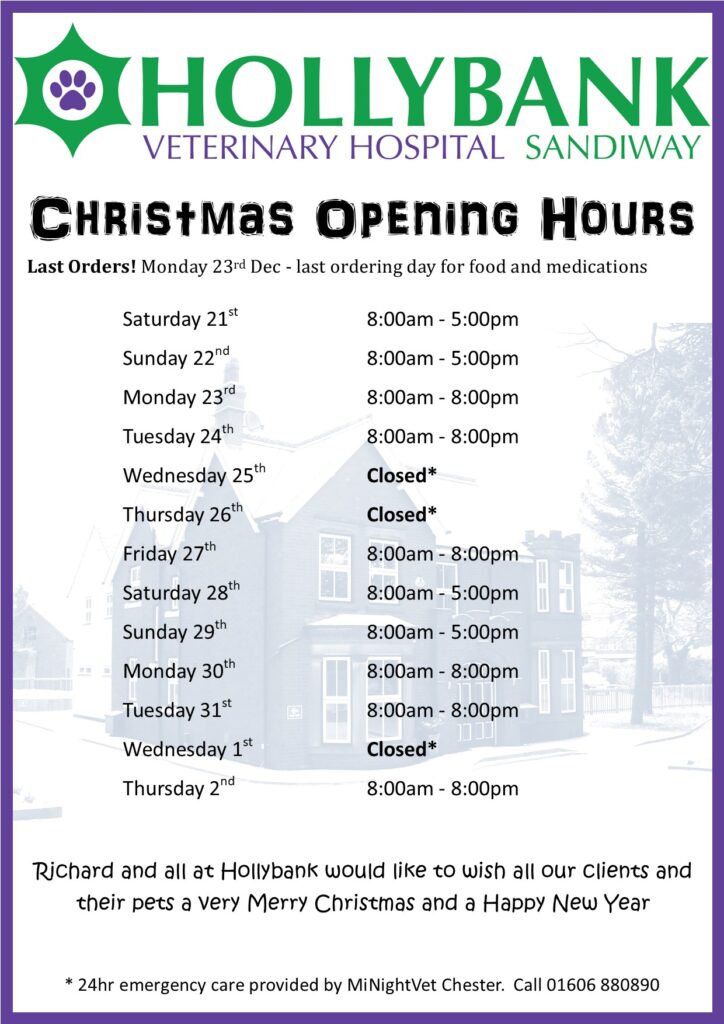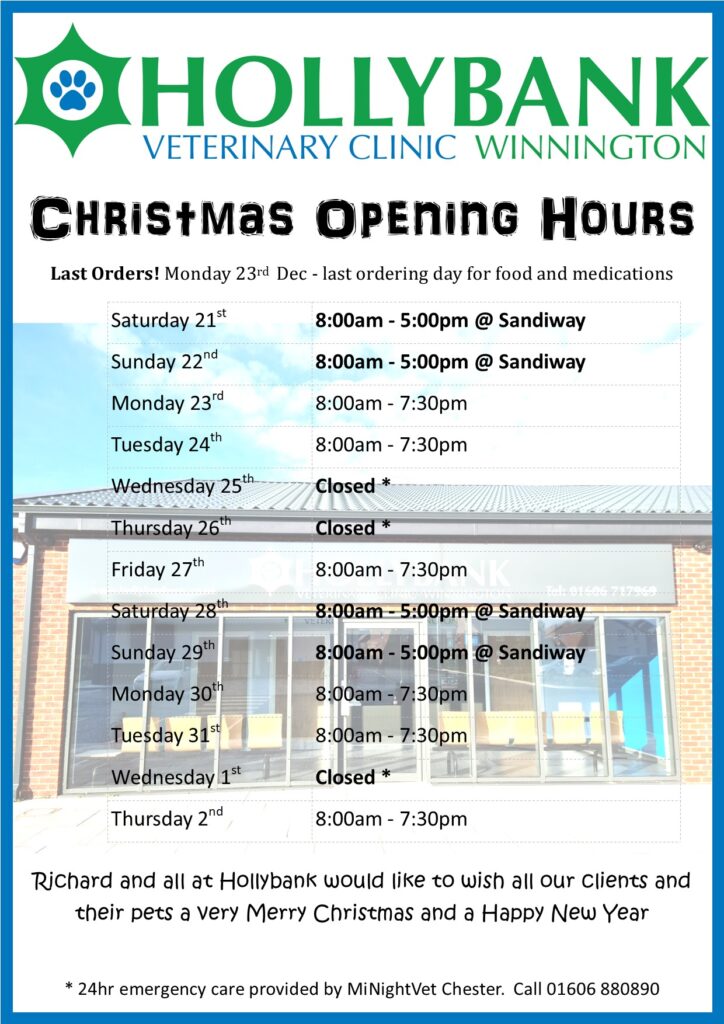

Mitzy’s owners came to see us at Hollybank in October because they were worried about her heart. On a few occasions at home, they had heard her heart beating very loudly which is very unusual to experience without a stethoscope!
We already knew Mitzy had a heart condition called mitral valve disease which had been diagnosed by our visiting cardiologist by an echocardiogram (an ultrasound of the heart).This condition is where the mitral valve becomes thickened and will leak blood back into the left atrium of the heart. This backwards flow of blood is turbulent and produces the noise we hear and call a heart murmur. The backwards flow causes an increased volume of blood in the left atrium, which leads to an enlargement of the chamber as the heart tries to compensate. Once the heart can no longer compensate, congestive heart failure may develop as fluid builds up in the lungs.
Mitzy’s last echocardiogram was in February of this year and showed Mitzy was compensating well, did not yet require any medications and she was due for a routine echocardiogram in November. However, when we listened to Mitzy’s heart, initially, a normal heart rate was heard, but then Mitzy’s heartbeat sped up and grew louder for about 10 seconds. This made us concerned that Mitzy was experiencing runs of tachycardia (increased heart rate), and during these times, her heart was unlikely to be working efficiently.
We started some medications to improve the contractility of Mitzy’s heart and planned for her to see the cardiologist that week. Mitzy had repeat echocardiography, an electrocardiogram (ECG) to look at her heart rhythm, blood pressure measurements and a blood test to rule out certain causes of the tachycardia i.e electrolyte imbalances. The blood pressure and blood tests were normal.
However, the ECG revealed an arrhythmia and runs of tachycardia up to 220 beats per minute! A normal heart rate for a dog is around 80-120. To see how frequently these were happening throughout the day, a 24-hour Holter ECG monitor was fitted to Mitzy’s chest. The Holter had lots of wires that stuck to Mitzy’s chest, so she had to wear a body suit and a buster collar to make sure she didn’t chew them! As always, Mitzy was a perfect patient and kept her holter on the whole time despite her not looking very impressed with us!
The Holter report showed that the periods of tachycardia were happening frequently, so antiarrhythmic medication was required to try and correct this. Two weeks after starting the medication a new Holter ECG monitor would be repeated to assess her response. Shortly after starting the medications, Mitzy’s owner noticed an improvement at home in her – she seemed to have more energy and her heartbeat had only been heard once when she had got excited.
When Mitzy had her repeat holter fitted the ECG readings had improved on the medication but there were still some abnormalities. To try to better control Mitzy’s arrhythmia the cardiologist decided to try a different type of anti-arrhythmic medication and Mitzy is soon due to have her third Holter ECG monitor fitted.
Hopefully, the next ECG will show even more improvement but in the mean time we felt Mitzy deserved to be this month’s very brave pet!
Autumn is well underway and as usual, we wanted to remind you of those seasonal risks to our pets
Mushrooms and toadstools: There are thousands of mushroom species and the signs they cause can vary hugely depending on which species is ingested. These can range from gastrointestinal signs to hallucinations, behaviour changes and in severe cases, kidney and liver failure. If a sample of the mushroom can be safely collected at the time and/or photos taken of the location it was growing, including the top and underneath of the mushroom, this will allow the most accurate identification. Please remember to wash your hands after any handling of the mushroom yourself. Expert knowledge is needed to help identify the mushroom via the Veterinary Poisons Information Service (VPIS) who work closely with the Fungus Conservation Trust to provide, at a fee, this brilliant service to us so we can provide the best care for our patients.
Acorns, conkers and berries: If scavenged by our pets, signs can include vomiting, diarrhoea, reduced appetite and abdominal pain. Acorns may also cause an itchy rash and swelling of the lips or around the eyes. An additional risk to their ingestion is that their shape and size (particularly conkers) may cause an intestinal blockage. Like mushrooms, there are numerous species of berries, therefore if a sample or photo can be collected, that can help us identify and work out the best plan for your pet.
Spring Bulbs: This is the season for planting daffodils, tulips, and snowdrops. To prevent ingestion and potential gastrointestinal issues, please store these bulbs securely and ensure that pets are kept at a safe distance during the planting process.
Halloween chocolate: Chocolate is toxic to pets as it contains theobromine. The higher the cocoa content in chocolate, the more theobromine it contains and the more toxic it is. Signs include vomiting, diarrhoea, and abdominal pain, but with high doses, it can progress to neurological signs, such as seizures. Another toxic chemical found in sweets, including marshmallows, is Xylitol (a sweetener). Xylitol can cause blood sugar levels to drop to dangerously low levels and, in some patients, cause liver failure.
Fireworks, sparklers and glow sticks: Unused fireworks contain various components, including fuel and colouring agents, which can lead to gastrointestinal toxicity if chewed. Used fireworks present a lower risk, as the chemical components are typically expended during the display. While sparklers pose a risk for gastrointestinal upset, it is also important to exercise caution around pets due to their potential burn and fire hazards. Additionally, glow sticks and other glow-in the-dark toys are more prevalent during this season. The fluid inside these items is bitter and, if ingested, may cause distress, hypersalivation, and vomiting in pets. Symptoms are usually transient, and if safe to do so, rinsing the mouth can provide relief.
Human cold and flu medications: With flu season approaching, it is crucial to keep medicines out of reach of our pets, as many can be highly toxic. For example, paracetamol is particularly harmful to cats at any dose, potentially leading to anaemia, as well as liver and kidney damage. Similarly, ibuprofen poses a significant risk to both dogs and cats, with symptoms that can include vomiting and diarrhoea, potentially progressing to acute kidney injury and seizures.
Antifreeze, de-icers, and windshield washer fluid: These can contain a chemical known as ethylene glycol, which despite the inclusion of bittering agents, dogs and cats may still ingest. This chemical even at a small volume, can be toxic necessitating immediate veterinary attention. Sadly, cats are particularly susceptible to these toxic effects. Therefore, it is essential to keep bottles of antifreeze and windshield washer fluid tightly sealed and stored out of reach of pets during the colder months.
If you are worried that your pet has eaten something dangerous, please do not hesitate to contact us so that we can assess the risk and make the best plan for you and your pet. Contact us on 01606 880890 or 01606 717969.
Remember S.P.E.E.D